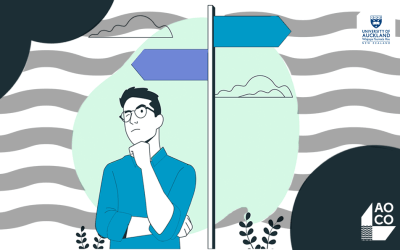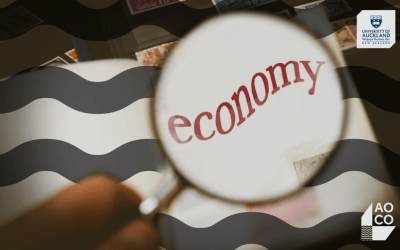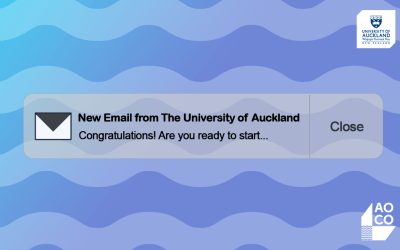MEDICAL & HEALTH SCIENCES
Postgraduate Certificate in Stroke Care (Online)
PGCertStrokeCare
Specialise in the care for people with stroke, from pre-hospitalisation care through to rehabilitation and return to the community. This interprofessional qualification is designed for healthcare professionals to advance their knowledge and skills in specialised stroke care.
Entry Requirements
Duration
2 Semester
Next Start Dates
- Semester 1: 3 March 2025 (applications close 17 February)
- Semester 2: 21 July 2025 (applications close 7 July)
Full Programme Fees*
$5,446.20 (estimate)
Programme Overview
The Postgraduate Certificate in Stroke Care delivers specialised training in all aspects of stroke treatment from pre-hospital care through to rehabilitation and return to the community. As the first interprofessional stroke-specific tertiary qualification in Aotearoa New Zealand, this programme is for healthcare professionals engaged in the care of people and whānau with stroke, such as nurses, physiotherapists, occupational therapists, speech language therapists, clinical exercise physiologists, counsellors, dietitians, medical doctors, optometrists, paramedics, pharmacists, psychologists, and social workers. Throughout this programme, you will learn how to apply and communicate the principles, evidence and practices that constitute evidence-based stroke care at the acute and rehabilitation stages of the patient journey. If you want to learn how to work as a culturally safe, reflective practitioner within an interprofessional team and contribute to improvements in the quality and safety of stroke care, this programme is for you!
Who, What, Why
Professor Cathy Stinear is the Programme Director for the Postgraduate Certificate in Stroke Care. She completed her PhD in Movement Neuroscience at the University of Auckland in 2004. She then worked for 4 years as a post-doctoral fellow on a large randomised controlled trial of stroke rehabilitation, before joining the Department of Medicine as a Senior Lecturer in 2008. She has been a Professor since 2019 and is currently Pro Vice-Chancellor Equity.
Watch our video to see why this programme could be ideal for you.
The Postgraduate Certificate in Stroke Care is for those who want to gain advanced and specialised knowledge and skills in stroke clinical practice, particularly focusing on the onset of stroke symptoms through to stroke rehabilitation. This evidence-based programme is aligned with contemporary clinical guidelines and practices. It incorporates emerging challenges and solutions to prepare students for the future of stroke care. It is highly relevant and interprofessional, with content coherently integrated across medicine, nursing, physiotherapy, occupational therapy, speech language therapy, optometry, clinical exercise physiology, and psychology. It has real-world impact by equipping students to provide specialised stroke care for the benefit of the thousands of people who experience stroke in Aotearoa New Zealand every year.
The Postgraduate Certificate in Stroke Care comprises 2 courses. Each course runs over a 12-week teaching period, allowing you to complete this programme in as little as two terms part-time, one course at a time.
Taught by experts in the field of stroke care, the courses are delivered in a specific order that will build advanced knowledge and skills in stroke clinical practice. The programme follows the patient journey, from the onset of stroke symptoms through to stroke rehabilitation. Case studies are threaded throughout both taught courses, to illustrate the diverse experiences of people and whānau with stroke, and the roles and responsibilities of all members of the interdisciplinary stroke team. As students in this programme, you will ‘walk alongside’ these example patients as the timeline of the patient journey is mapped onto the timeline of this programme of study.
| Course Code | Course | Description | Points |
| HLTHSCI 710 | Acute Stroke Care | Describes and evaluates advanced and applied interdisciplinary knowledge about pre-hospital care, diagnosis and hyperacute stroke care, secondary stroke prevention, stroke pathophysiology and pharmacological management of risk factors. Students will evaluate and critique stroke epidemiology and equity of access to stroke services. Skills in assessment of neurological impairment and rehabilitation needs, as well as discharge planning, will be developed with reference to national clinical guidelines and local contexts. | 30 |
| HLTHSCI 711 | Stroke Rehabilitation | Describes and evaluates advanced and applied knowledge of the biological processes underpinning neurological recovery after stroke. Students will develop interdisciplinary understanding of assessment and interprofessional treatment strategies for impairments in communication, swallowing, vision, sensation, cognition, mood, continence, and movement. Skills in assessing independence and participation using standard scales will also be developed for application in clinical practice. | 30 |
As a graduate of the Postgraduate Certificate in Stroke Care, you will be able to:
- Apply an advanced understanding of contemporary theory and practice of interprofessional stroke care at the acute and rehabilitation stages of the patient journey.
- Apply guidelines and knowledge to find culturally safe and practical responses to real-life challenges faced by people and their whānau with stroke
- Identify gaps between best practice and current practice, and potential solutions for improving the quality and safety of stroke care
- Understand the factors underlying inequities in patient experience and outcomes of stroke care.
The Postgraduate Certificate in Stroke Care is for those who want to gain advanced and specialised knowledge and skills in stroke clinical practice, particularly focusing on the onset of stroke symptoms through to stroke rehabilitation. This evidence-based programme is aligned with contemporary clinical guidelines and practices. It incorporates emerging challenges and solutions to prepare students for the future of stroke care. It is highly relevant and interprofessional, with content coherently integrated across medicine, nursing, physiotherapy, occupational therapy, speech language therapy, optometry, clinical exercise physiology, and psychology. It has real-world impact by equipping students to provide specialised stroke care for the benefit of the thousands of people who experience stroke in Aotearoa New Zealand every year.
The Postgraduate Certificate in Stroke Care comprises 2 courses. Each course runs over a 12-week semester, allowing you to complete this programme in as little as two semesters part-time, one course at a time.
Taught by experts in the field of stroke care, the courses are delivered in a specific order that will build advanced knowledge and skills in stroke clinical practice. The programme follows the patient journey, from the onset of stroke symptoms through to stroke rehabilitation. Case studies are threaded throughout both taught courses, to illustrate the diverse experiences of people and whānau with stroke, and the roles and responsibilities of all members of the interdisciplinary stroke team. As students in this programme, you will ‘walk alongside’ these example patients as the timeline of the patient journey is mapped onto the timeline of this programme of study.
| Course & Description |
| Acute Stroke Care (HLTHSCI 710) 30 pointsDescribes and evaluates advanced and applied interdisciplinary knowledge about pre-hospital care, diagnosis and hyperacute stroke care, secondary stroke prevention, stroke pathophysiology and pharmacological management of risk factors. Students will evaluate and critique stroke epidemiology and equity of access to stroke services. Skills in assessment of neurological impairment and rehabilitation needs, as well as discharge planning, will be developed with reference to national clinical guidelines and local contexts. |
| Stroke Rehabilitation (HLTHSCI 711) 30 points Describes and evaluates advanced and applied knowledge of the biological processes underpinning neurological recovery after stroke. Students will develop interdisciplinary understanding of assessment and interprofessional treatment strategies for impairments in communication, swallowing, vision, sensation, cognition, mood, continence, and movement. Skills in assessing independence and participation using standard scales will also be developed for application in clinical practice. |
As a graduate of the Postgraduate Certificate in Stroke Care, you will be able to:
- Apply an advanced understanding of contemporary theory and practice of interprofessional stroke care at the acute and rehabilitation stages of the patient journey.
- Apply guidelines and knowledge to find culturally safe and practical responses to real-life challenges faced by people and their whānau with stroke
- Identify gaps between best practice and current practice, and potential solutions for improving the quality and safety of stroke care
- Understand the factors underlying inequities in patient experience and outcomes of stroke care.
Disclaimer: *The programme fees are indicative and estimates only. Fees are set in advance of each calendar year and will be updated on this brochure. Fees are inclusive of 15% GST, but do not include the Student Services Fee, course books, travel and health insurance, or living costs. Fees will be confirmed upon completion of enrolment into courses.
Enquire Now
(Takes less than 1 minute)
Get personalised advice and updates on scholarships, application deadlines and flexible online options direct from our team.
Fields marked with * are required.
What to think about when changing careers
If you’re feeling stuck in your job or you’re simply looking for a new challenge, a career change can shake things up and find your passion. But before you make the leap, here are a few things you need to think about!
The State of The Economy: Global Economy and New Zealand
New Zealand is a small open economy that is highly integrated with the global economy. This means that our economic performance is closely linked to the performance of our trading partners. In recent years, the global economy has been undergoing a period of...
The Future of Learning: A Glimpse into Auckland Online Short Courses
Embark on a journey of lifelong learning and personal growth with Waipapa Taumata Rau | The University of Auckland’s 100% online courses.




